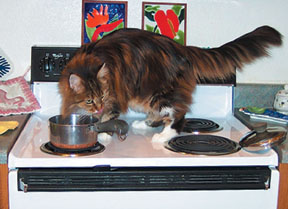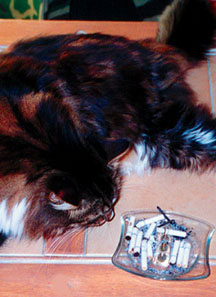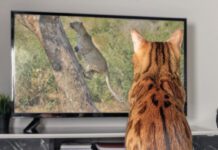
288
Keeping your cat indoors is a first step to ensuring a safe environment, but the indoor lifestyle is certainly not without potential hazards. To eliminate danger, you need to cat-proof your home by making a clean sweep to conceal or remove anything that poses a risk to your cat.
Dont Eat That!
Chemicals such as paint thinners, cleaning compounds, insecticides, alcohol and human medicines can be harmful or even fatal to cats that consume them. Any chemical should be kept out of reach, says Diane Eigner, VMD, director of The Cat Doctor, a feline hospital in Philadelphia, Pennsylvania.
The odor of many chemicals will keep a cat away, but some – such as antifreeze – may actually attract a cat. Newer types of antifreeze are made from propylene glycol instead of ethylene glycol, but no antifreeze is completely safe. Propylene glycol antifreeze is still toxic if your cat ingests enough of it.
If you call the exterminator, make sure that he or she knows that a cat lives in your home. Dont use rodenticides containing anticoagulants, advises Dr. Eigner. Obtain cat-safe flea-control products from your veterinarian. (Read labels carefully if shopping for them in the pet store.) Permethrin products intended for use on dogs can be deadly if applied to a cat. If you use the product on your dog, keep the animals separated for two to three days, advises Dr. Eigner.
Keep all medicines out of reach. According to the University of Arizona College of Pharmacy Arizona Poison and Drug Information Center, cats should not be given any medication containing aspirin, phenylbutazone, indomethacin, ibuprofen, naproxen or acetaminophen (Tylenol), as it may cause serious illness or death. Dont even put aspirin in your tree stand at Christmas, says Dr. Eigner.
Plants add life to an indoor environment, but may harm a cat if he ingests one that is poisonous. Eating plants may cause a variety of symptoms ranging from mild upset stomach to seizures and even death. Although your cat may only get gastrointestinal upsets from eating some plants, eating a lily can be fatal, says Dr. Eigner.
Tiny Objects and Small Spaces
Like toddlers, some cats may accidentally swallow small objects such as coins, paper clips, rubber bands, jewelry or craft items such as needles, pins and string. Ive pulled pennies, nickels and dimes out of cats, says Dr. Eigner. I even operated on a cat who swallowed a straw craft item that punctured his stomach wall.

216
Always consider safety when selecting toys for your cat. Buy toys with no eyes or other small parts that your cat could swallow, says Dr. Eigner. Tuck away wand toys with strings after use.
Small spaces present potential hazards for cats that slip into them. Dryers are very seductive to cats because they are warm, says Dr. Eigner. Close the dryer door as soon as you remove a load of clothes. Your cat may become trapped in your recliner when you lower the footrest, so make sure your cat hasnt crawled into it.
Freak Accidents
Pet sitter Ann Kulp visited a cat that had stuck her head through the stairway railing and then couldnt get it out again. Kulp freed the cat from the banister. Fortunately, she wasnt harmed, says Kulp.
No amount of forethought will ever eliminate all of the potential dangers in your home, but with some careful planning, you will be able to eliminate most of them. To get a perspective from a cats-eye view, you should crawl around on your hands and knees and secure anything that looks like it might cause trouble. Take a topside view and batten down anything precariously balanced – an iron sitting somewhere with a dangling cord, knives left out on the counter, scissors open and easily dropped, or dangling mini-blind cords. Think twice about how you dispose of things, says Dr. Eigner. Dental floss, can lids with sharp edges and string can cause injury to a cat that licks or swallows them.
Keep your veterinarians phone number and the number for an after-hours emergency clinic handy at all times. Keep a pet first-aid kit available in case of injury and learn the basics of pet first aid.
The Cornell University Poisonous Plants Informational Database at www.ansci.cornell.edu/plants/ lists plants by common and scientific names and includes links to other poisonous plant databases.
If your cat has ingested a toxic substance and you are unable to reach your veterinarian, contact the ASPCA Animal Poison Control Center at 888-426-4435. Veterinarians are available to answer your call 24 hours a day, 365 days a year. The $50 consultation fee may be paid by credit card.



